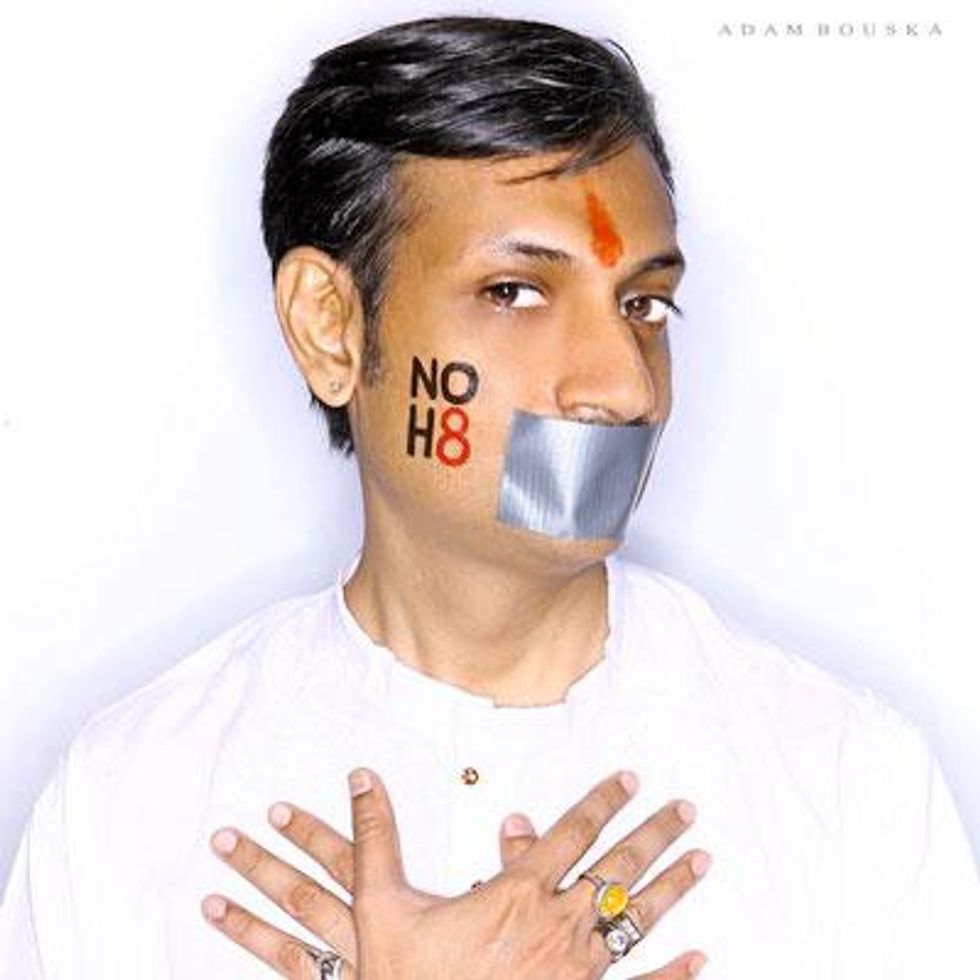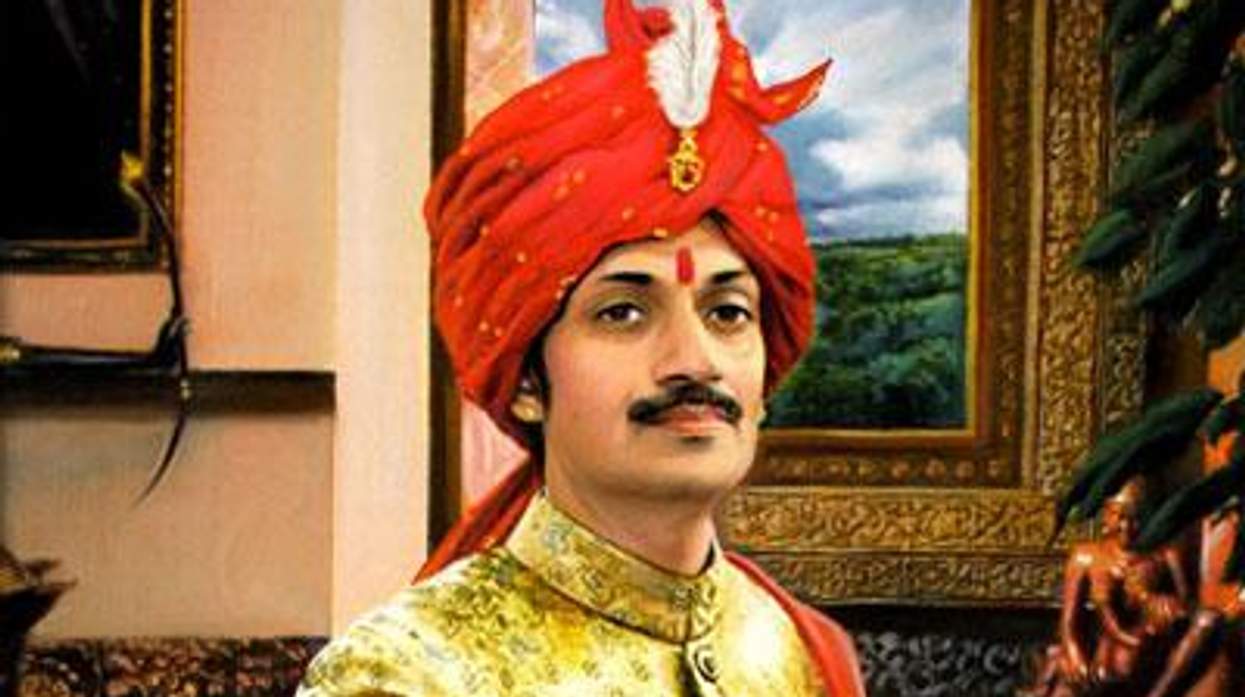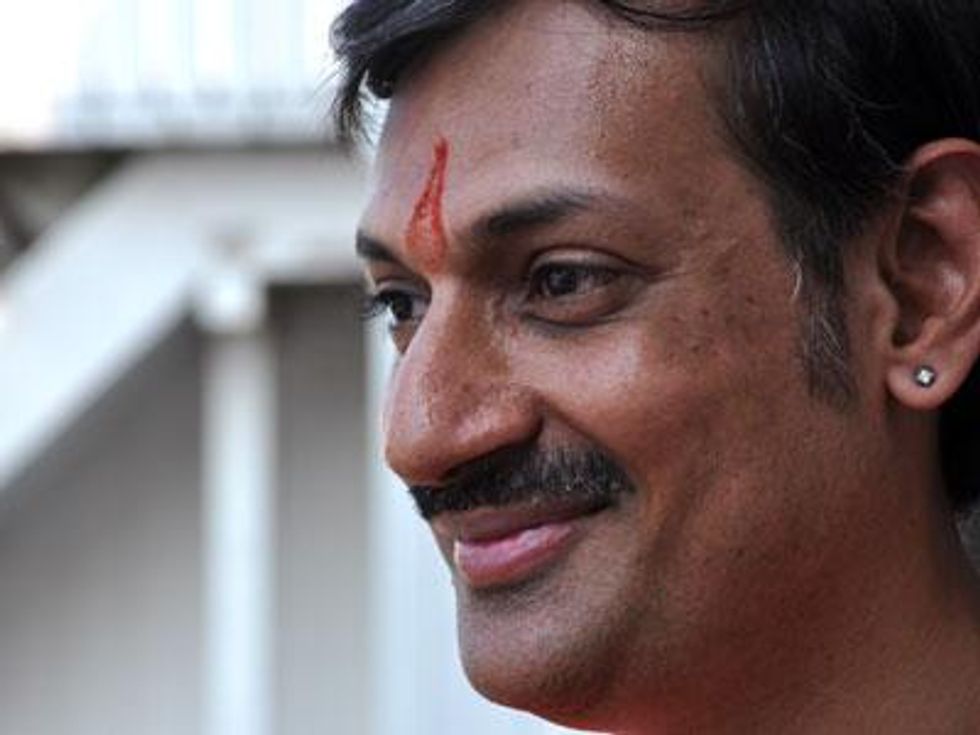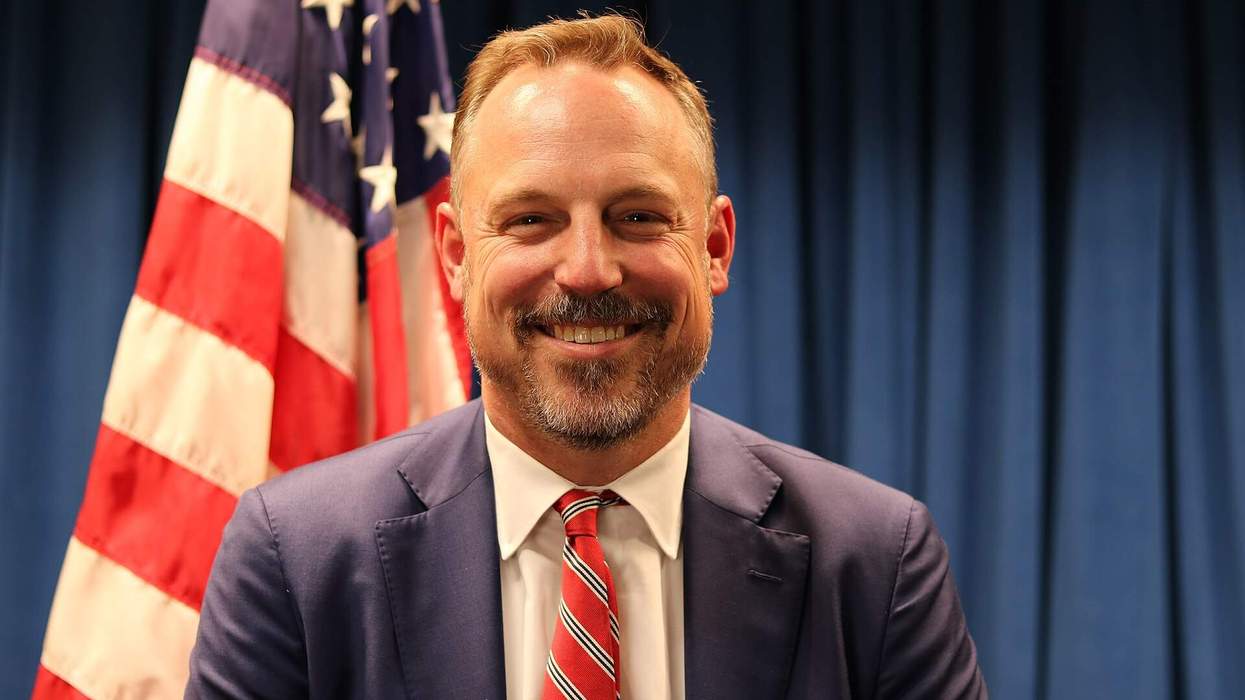Mahatma Gandhi, a pivotal figure in India's successful fight for independence from British rule, used nonviolent methods effectively to push his society toward greater civil equality and freedom, knowing he had truth on his side. Although Gandhi's life ended more than a half-century ago, a crown prince in India is hoping to carry on that iconic mission, expanding Gandhi's vision to create a truly free and equal India -- one that respects, recognizes, and protects LGBT citizens.
Until December of last year, India's LGBT population had enjoyed a four-year renaissance, says Manvendra Singh Gohil, Crown Prince of Rajpipla. That brief period of freedom began in 2009, when a Delhi High Court struck down section 377 of the Indian Penal Code, which criminalized same-sex sex acts.
"We enjoyed our freedom for four years, and now we are back to square one," says the prince, who made history when he became the first openly gay royal by coming out in 2006. "So I have seen both sides of it."
The other side to which Gohil refers was brought into sharp focus in December, when the Indian Supreme Court reversed that 2009 decision, reinstating the colonial-era law that prescribes 10-year prison terms for anyone engaging in "carnal intercourse against the order of nature with man, woman, or animal."
India's LGBT citizens were outraged and took to the streets demanding that the court reconsider its decision -- which it recently announced it will do in the coming year. Gohil, 48, was among those protesting the decision.
"I was definitely involved in the protests," Gohil tells The Advocate. While acknowledging that the December ruling was a blow that shocked and upset LGBT Indians, the prince sees the silver lining that's emerged from the decision.
"We got more support from the heterosexual world when we lost than we got when we won the case," Gohil explains. "And that's very important for us, because that gives us an encouragement, and we realize that, yes, people are in our favor. ... Because it's easy to support people who are winning. It's not easy to support people who lose."
As the world's only openly gay royal, Gohil is no stranger to being associated with the marginalized -- a unique position for a prince who is due to inherit the throne of the former Kingdom of Rajpipla, now located in the Indian state of Gujarat. That awareness of repression, even from his privileged background, is another point where Gohil, a soft-spoken but passionate man, draws inspiration from Gandhi.
In 2006, when Gohil publicly announced that he is gay, section 377 was still in force, and his coming-out launched a media firestorm and conflict within the royal family that is, to this day, not fully reconciled. Gohil has since appeared twice on Oprah and was featured in TLC's 2012 miniseries Undercover Princes, on which he and two other royals pretended to be commoners in England in the hopes of finding true love.

Since he was out as gay before section 377 was repealed -- and after it was reinstated -- the prince says he is unafraid of the 10 years of jail time to which he could be sentenced to serve if he were in a relationship with another man. (At the moment, the prince notes that he is "single and ready to mingle, as you say.")
"According to me, I am not doing anything wrong by being openly gay," Gohil says. "So I don't have any fear in me, because I am working for the community and working for HIV and AIDS, and the government is supporting me for my foundation."
Indeed, the prince's Lakshya Trust, the 14-year-old nonprofit which he chairs that provides education, resources, and medical care to HIV-positive men and transgender women in India, receives the entirety of its funding from the Indian government. And that relationship isn't likely to sour anytime soon, as Gohil notes that the government granted his trust an increase of funds for the next fiscal year, which will allow the organization to access new facilities and programs that have thus far been unattainable.
But the irony of the government supporting an organization that specifically works with a population recently recriminalized is not lost on the prince.
"On the one hand, the government is penalizing us, and on the other hand, the same government is signing a contract with us," he explains. "So will it lead to abatement of crime? It's a question-mark."
(RELATED: The Complicated LGBT India Since 2003)
Section 377 does not include a prohibition on the so-called promotion of homosexuality, as do antigay laws enacted in countries such as Uganda and Russia. However, that hasn't stopped Indian officials from targeting the prince's charitable trust -- even beating and arresting staff members who were attempting to distribute condoms and information about HIV.
"Distribution of condoms is for encouraging safe-sex behavior," Gohil says emphatically. "It's not a crime! It's a favor we are doing to the society. And if the police can go to the extent of beating up our staff, sexually exploiting them, blackmailing them, even arresting them, taking to jail ... then we all can understand that it is a complete misuse of the law."
And while Gohil is adamant that the ultimate victory for India's gay populace won't come through a courthouse, but rather in the changed hearts and minds of the nation's citizens, he does acknowledge that some judicial rulings can provide integral protections to marginalized populations.
That was particularly apparent, Gohil notes, when the Supreme Court -- the same court that recriminalized homosexuality in December -- formally recognized a third gender in April.
"One has to understand that the concept of transgenderism in U.S. is quite different than that in India," Gohil explains. "In India, when we say transgender, it's a culture. It's a tradition which has been existing in our culture [for] centuries. And there are mentions of this transgender community in our sacred texts, in our mythology -- there have been characters in our old epics that talk about the transgender [people], and they have also been used to bless people."
There are several classes of those who would be categorized as transgender by Western terminology, Gohil explains.
"When this ruling came, it was more toward the issue of whether they should get social entitlement," he says. "Because the transgender community in India don't consider themselves to be males, and neither do they consider themselves to be females. They say, 'We belong to a third category.' And that has never been part of our documents -- so much so that the population of India is wrong. Because the population has never taken into account the transgender population."
But in accordance with the April ruling, India's trans people -- those who identify as hijra as well as others who press the boundaries of accepted gender norms like cross-dressers, known as koti -- are now guaranteed the right to vote, to access appropriate and competent medical care, and to be protected from discrimination in housing, employment, and education.
"The ruling which has come talks about recognizing them as individuals, giving them the social entity or identity in the society," Gohil continues. He notes that his Laskhya Trust not only employs several trans individuals but has been working with trans and gender-nonconforming people since its founding in 2000. Like transgender women stateside, transgender Indians are at a higher risk for HIV infection, and are more likely to be economically disenfranchised and forced to turn to sex work for survival.
That April ruling brings India's regulations into accordance with neighboring nations that formally recognize a third or indiscriminate gender, including Nepal and Pakistan, as well as Western nations including Germany, Australia, and New Zealand.
Although Gohil stresses that the latest ruling applies most directly to a particular subset of the LGBT community, he acknowledges that the day the decision came down was "a good day for getting recognition for our larger LGBT community."
What's more, the size and scope of that community continues to grow, despite the recent setback at the courts.
"A lot of support has come from the heterosexual world," explains Gohil. "That is a very strong point for us to go ahead."
Gohil notes that when section 377 was repealed in 2009, gay and lesbian culture and visibility in India flourished. This population experienced what Gohil calls a "mainstreaming," where gay and lesbian story lines were included in mainstream books, television, music, and even in Bollywood.
But there was an even more powerful influence waiting in the wings, awakened by the recent ruling reinstating section 377.
"When the Delhi High Court legalized us, a lot of gays in our country, they came out to their parents, and they decided not to get married," says Gohil. "But now ... the parents are getting concerned. Now that the children are out, and some of them have even come out in the media, they are scared for their security, that now they will be viewed as criminals. So they are worried whether the children will be safe or not."
Gohil says this familial concern has given rise to a group of parents and family members of LGBT Indians that he likens to the U.S.-based group PFLAG. And that support, combined with the brief taste of freedom, has started something inside India's LGBT community that now seems unstoppable.
"The four years of that freedom has been taken, snatched away from them," says Gohil of the sentiment among LGBT Indians. "So that's the kind of anger which has been shown, that the privacy of their bedroom has been attacked by the government."
Even the threat of jail time hasn't deterred them from pushing for greater visibility and demanding equality.
"Even though we had a Pride just after the ruling came, more people [than ever before] came and took part in the Pride, and also without masks," explains Gohil. "Which means that people have now started revolting. They have started protesting openly -- at first there was a fear, and now, people say 'We don't care ... you can go ahead and we will have forced arrests done. ... If we are to struggle and get our freedom, then we don't mind indulging in getting these kind of things.'"
And that's where Gohil sees his community continuing to take inspiration from Gandhi, who galvanized a nation behind the principles of freedom and choice so many years ago.
"I think the LGBT movement and the freedom movement of India is quite similar," Gohil says. "We are going on the same terms, and his fight was also based on truth and honesty, which is my fight -- or rather the fight of the gay activists of India. So I always believe that if he can win India's freedom on the basis of truth and honesty, then we are also following the same principles as our national leader. There is no doubt that we shall be victorious. We will definitely win one day."


















Charlie Kirk DID say stoning gay people was the 'perfect law' — and these other heinous quotes
These are some of his worst comments about LGBTQ+ people made by Charlie Kirk.